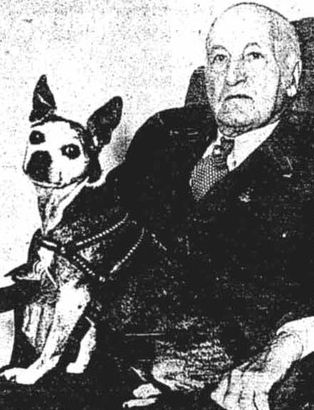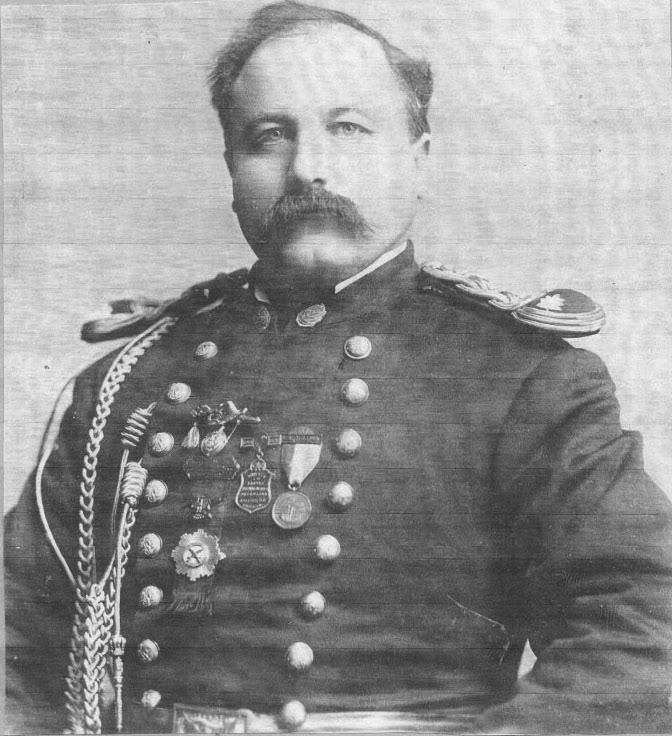Encyclopedia Dubuque
"Encyclopedia Dubuque is the online authority for all things Dubuque, written by the people who know the city best.”
Marshall Cohen—researcher and producer, CNN
Affiliated with the Local History Network of the State Historical Society of Iowa, and the Iowa Museum Association.
SAUNDERS, Charles J. W.
SAUNDERS, Charles J. W. (Bonnfeld, Germany, Aug. 12, 1852--Hollywood, CA, Aug. 3, 1939). MAYOR. Saunders, an acquaintance of famed western figures "Wild Bill" Hickok, "Texas Jack," and William F. "Buffalo Bill" Cody, served as mayor of Dubuque from 1891 to 1893 following the resignation of Robert W. STEWART. (1)
Known to Dubuque residents as "California Charlie," Saunders came to America prior to the CIVIL WAR. At the age of twelve he enlisted in the Army and served as a bugler with the Union during the Shenandoah campaign. At the end of the war, he was mustered out and returned to his home in Philadelphia where he worked eighteen months as a cigar maker. (2)
Saunders re-enlisted with the cavalry during the Pawnee campaigns in Kansas, the Sioux campaigns in Kansas, Texas and Colorado and ended up fighting the Apaches in Arizona where he was discharged from the Fifth Cavalry for disability. As a bugler, Saunders had to know all 120 bugle orders including the field calls. He always rode with the captain or the second lieutenant. Because of their importance in sounding orders to the troops, two buglers rode with military units in case one of them was wounded or disabled.
Saunders was discharged from the military in San Diego, California. He began buying cattle and shipping them to other sites in California. He continued that business for ten years in addition to acquiring a ranch in Arizona which he still owned in 1880. His travels, it was claimed, gave him some proficiency in German, Spanish, French and Italian. (3)
He married a Dubuque girl, Elizabeth Streinz, and in 1880 both returned to Dubuque to live. Saunders operated the SAUNDERS-HICKSON MEAT CO. at 22nd and Jackson and later the corner of Eleventh and Main STREETS. (4) He was also involved in real estate. In February, 1891 Saunders advertised that he had fifty lots, 50' by 100' or larger, in Fairmount Park Addition for sale at $100 each to people who would build a home within eighteen months. (5) It was his position of superintendent of the FRITH'S UNION SLAUGHTER HOUSE that resulted in him becoming involved in a quarrel with Dr. Wieland, the city physician. Wieland had inspected the slaughter house and reported it to be filthy. Saunders' suggestion several days later that the council visit the company was accepted. (6) Perhaps as no surprise, the establishment was in good order.
During his military career in the West, Saunders was a member of the Fosyth Scouts, seven soldiers under the leadership of William F. Cody. (7) Cody and a group of actors presented "Knights of the Plains" in the Opera House on September 5, 1879 to great applause. (8) When Cody began his famous "Buffalo Bill's Great Wild West Show and Congress of Rough Riders," Saunders persuaded him to bring the extravaganza of more than two hundred fifty authentic Native Americans and cowboys to Dubuque on September 28 1896. (9) The program remained a favorite of Dubuque residents every four years until 1912. On every visit Cody sought out his friend at Saunders' meat market. The two would reminisce and tell tales of their days riding after renegades. (10)
For three terms Saunders served by appointment on the Soldiers' Relief Commission of Dubuque County. In September 1891 he was presented a special badge from the members of the Hyde Clark Post for his aid to former members--finding a job for an old soldier, contributing to projects, or participating in funeral processions. (11) He was honored with a number of offices. For two terms he served as Alderman from the Fifth Ward, was elected mayor in 1891 and 1892, and for four years served on Governor Boies' staff with the rank of Colonel. Socially, he was a member of the Masonic Lodge and Odd Fellows. (12)
Improvements to Dubuque sewer system were undertaken during his administration. The major sewer on Dodge Street was constructed out to Grandview at a cost of $15,000 with its connection on South Dodge costing $2,000. The 11th Street sewer was arched from the bluff to the river at a cost of $7,000 and the 14th Street and Iowa Street sewers each costing $2,500. The 17th Street sewer was arched and extended for $7,000. A sewer had to be constructed under Main Street before it was paved which proved expensive at $30,000.
Storm damage led to the construction of retaining walls on Seminary Hill at a cost of $5,000 and on Leibnitz Street for $4,000. His supporters also pointed to the new cement sidewalks around the parks and the DUBUQUE CITY HALL at at cost of $5,000, the completion of the Central fire house for $40,000, the construction of patrol houses on 13th and Washington, and the acquisition of a new fire steamer for $4,000. (13)
In August 1891, Saunders, as mayor, broke a tie vote among the councilmen to give Joseph A. RHOMBERG a long-awaited right-of-way for the DUBUQUE ELECTRIC RAILWAY, LIGHT AND POWER COMPANY. In the same month, he was highly critical of the street commissioner and how he ordered work done without council approval. The auditor reported finding $14,500 worth of bonds issued in 1853 and 1858 on which no interest had been paid. (14)
Street surfaces concerned the council in 1891. Several members in September visited Galesburg, Illinois, Burlington and Davenport, Iowa to examine the merits of brick paving. This put to rest the idea of using granite blocks for the streets. (15) The reports must have been positive because three miles worth of brick were ordered at the September 17th meeting of the city council. Main, South Main and Iowa would be paved their entire lengths. (16) Despite an effort to raise his salary as mayor, Saunders refused to sign the warrant issued by the treasurer for $1,000 because when inaugurated he had said he would accept no more than $600. (17)
In January, 1892, the Diamond Jo Line of steamers was granted the right to occupy and use a certain part of the public levee and to erect and maintain a warehouse and office. This ordinance was vetoed by the Mayor and was passed over his veto. (18) The Mayor's veto was based upon the opinion that the city did not receive enough money for this franchise. The wards were redistricted into precincts with 500 votes each. Mayor Saunders also recommended hiring detectives by the city to watch the actions of the police force and protect the public. (19)
In March 1892 the question arose of whether the City of Dubuque should have its own municipal lighting plant. At the present time, the lights operating in the city and provided by the private lighting companies cost $68.00 per year. If the city took over the utility, the cost would rise to $135.95. (20)
Mayor Saunders said in his valedictory in 1893:
I also wish and hope that the incoming council will at an
early day get used to that double issue of political life,
namely: Petitions signed by prominent citizens for the opening
of streets, etc., that would be a very large expense to the city
and then in less than three months afterward the 'prominent'
citizens shout their lungs weak for reform."
Upon leaving office, Saunders and his wife left Dubuque. He had for some time been interested in cattle ranching around Phoenix, Arizona with his brother-in-law. (21)
See: CHARLES J. W. SAUNDERS--2518 BROADWAY
--
Source:
1. http://samanthastone.proboards.com/thread/6131
2. Ibid.
3. "Mayor Saunders a Linguist," Dubuque Daily Herald, August 18, 1891, p. 4
4. http://samanthastone.proboards.com/thread/6131
5. "Special Inducements to Get a Home," Dubuque Daily Herald, February 1, 1891, p. 8
6. "Well Done, Wieland," Dubuque Daily Herald, August 24, 1892, p. 4. Online: https://news.google.com/newspapers?nid=_OG5zn83XeQC&dat=18920824&printsec=frontpage&hl=en
7. http://samanthastone.proboards.com/thread/6131
8. "Buffalo Bill," Dubuque Herald, September 5, 1879, p. 4. Online: https://news.google.com/newspapers?nid=uh8FjILnQOkC&dat=18790906&printsec=frontpage&hl=en
9. "A Splendid Cavalcade," Dubuque Daily Herald, September 27, 1896, p. 3
10. http://samanthastone.proboards.com/thread/6131
11. "Solid Silver to a Soldier," Dubuque Daily Herald, September 17, 1891, p 4
12. Portrait and Biographical Record of Dubuque, Jones and Clayton Counties, Iowa. Chicago: Chapman Publishing Company, 1894, p. 127
13. "What Mayor Saunders Did," The Dubuque Herald, March 25, 1900, p. 4
14. "After Many Moons," Dubuque Daily Herald, August 4, 1891, p. 4. Online: https://news.google.com/newspapers?nid=_OG5zn83XeQC&dat=18910804&printsec=frontpage&hl=en
15. "Will Pave," Dubuque Daily Herald, September 12, 1891, p. 4.
16. "Streets Will Soon Shine," Dubuque Daily Herald, September 18, 1891, p. 4
17. "Municipal Molecules," Dubuque Daily Herald, December 16, 1891, p. 8
18. "Passed Over the Veto," Dubuque Daily Herald, January 14, 1892, p. 4
19. "The Mayor Got Hot," Dubuque Daily Herald, January 5, 1892, p. 4. Online: https://news.google.com/newspapers?nid=_OG5zn83XeQC&dat=18920105&printsec=frontpage&hl=en
20. "A Municipal Light Plant," Dubuque Daily Herald, March 13, 1892, p. 8
21. "An Arizona Cattle King," Dubuque Daily Herald, February 21, 1893, p. 4



